Witcher 3 is a very popular game, but for all that, I suspect most people who have played it have never read the books it is based on. So with that in mind, let me tell you a story first, or two stories, of two women. Just a fair warning though, they contain major spoilers for the Witcher saga.
The first woman is a powerful sorceress, so powerful she will one day be named a member of the Council, the second highest magical office in her part of the world, making her one of the ten most important people in magical circles (and so among about thirty most important people in that world). She has scores of both magical and political power, and the only thing she misses in her life is a child. She cannot have children and it’s a great tragedy for her. Otherwise she is quite content, though.
One day when she is in bed with her lover, a witcher barges in to ask for her help with a genie whose attention he’d inadvertently attracted. She agrees to help him, and the witcher is enchanted by her. Not literally, I mean, he just has a crush. The sorceress tries to get the genie to fulfil her wish of having children at a great risk, and she almost dies. The witcher goes in to save her and realizes he is in fact the genie’s master and has to ask for one last wish before the genie would leave them alone. So he asks for the love of the sorceress.
The genie delivers, and the sorceress, feeling said love, takes the witcher with her into her life or riches, power and luxury. They live together for a time, until one day he decides he doesn’t like it any more and just up and leaves without saying goodbye. She is not someone to be broken by a thing like that, so her life goes on until they meet in another of her attempts to cure her infertility, where he saves her life yet again (she is also threatened by rape while in danger because of course she is).
He shows interest in getting back together, so she takes him with her to the city where she now lives, friendly with a local mage. Soon enough, the witcher finds out she is sleeping with both him and the mage, trying to decide between them, and the two engage in some pissing contests. It ends with her leaving them both.
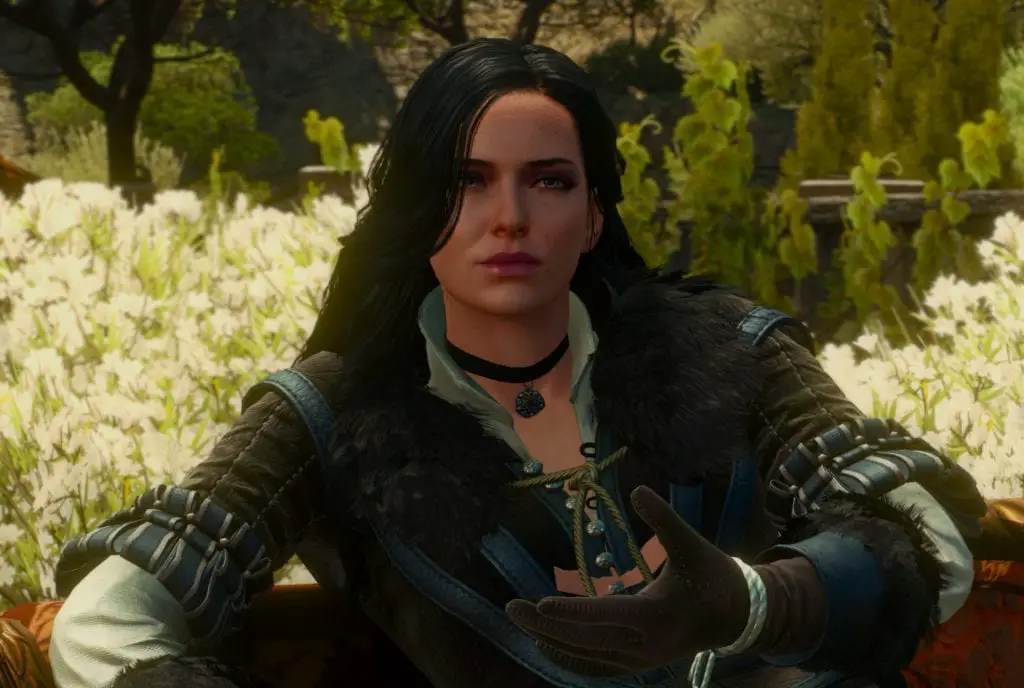
Sometime either in this period or after he disappeared from her life for the first time, the witcher also starts sleeping with her best friend. The next contact she has with him is indirect, when he sends his adoptive daughter to her for magical training. She trains her, and loves her as her own daughter. Because the girl needs more education than one sorceress can provide, she later takes her to a magical school. That is where everything goes pear-shaped as the girl is lost and the sorceress imprisoned. After some time, though, the powerful woman is freed by another sorceress. She uses all resources at her disposal, humbles herself in front of a religion she doesn’t believe in, to find a way to reach where she suspects the girl is. She risks her life to save her, and ends up being imprisoned and tortured and threatened with sexualized violence.
After she is saved by the witcher yet again (yes, I know), she fights against her friend’s sorceresses to keep the girl’s freedom from their political manipulation. She manages to get her one trip to see her adoptive father at least. On the way there, though, they find him being attacked, and the sorceress tirelessly fights to save him, and then to heal him. She is too late, however, and by her efforts to heal him, she exhausts herself and they both die.
Lovely story, isn’t it? But let’s not unpack all the sexism in that, because there is the story of her best friend to go through, too.
This friend is a powerful sorceress as well, though not quite as powerful as the first one. She meets her best friend’s “destined love” and falls in love with him, and at some point starts sleeping with him behind her best friend’s back. The affair peters out after some time, but then he calls for her help with training his adoptive daughter. She goes, chiefly with the hope of renewing the affair because she is still in love with him. But she comes to care for his daughter as well, though she is heartbroken when she finds out he is no longer interested in her. She then has to recommend the training of said daughter to her best friend, because it is too difficult for her.
After the girl is lost and her best friend imprisoned, she accepts a place in a newly formed ruling organ of sorceresses which, incidentally, is complicit in keeping her best friend imprisoned. She is not even the one who frees her. Her complicity continues as the Lodge plans to manipulate the witcher she is in love with and the girl she has grown to love. She lies to her best friend about it when said friend tries to contact her for help in saving the girl. In the end, though, she does vote to allow the girl her small modicum of freedom, and fights alongside her best friend to save the witcher from his attackers. That is the last we see of her in the books.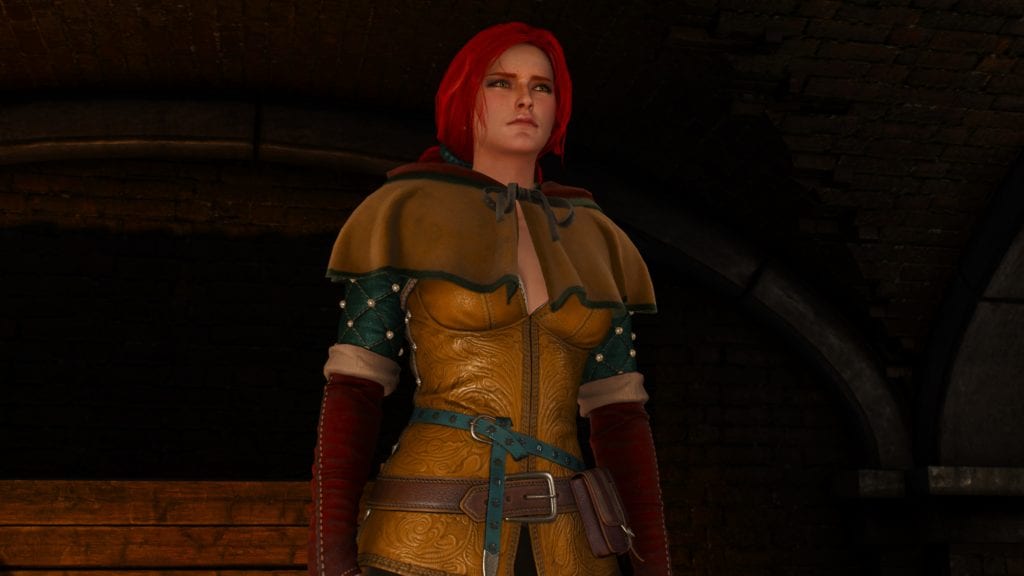
As you have probably guessed by now, given some of the plot elements are mentioned in the game, the first is Yennefer and the second is Triss.
But looking at this recounting of what they did, of the events of the portion of their life we know from the books, which would you say was more heroic, more of an admirable figure?
But that is not all there is to their characterisation, naturally. Yenn is a sharp-edged, cynical, sarcastic and frequently painfully honest woman. Triss, on the other hand, is usually pleasant and kind, given the moniker “little” by her fellow sorceresses because she is relatively young for one of them, and generally she displays more feminine attributes. Yennefer is exactly the kind of woman that gets labelled “bitch” for daring to have power. Triss is the kind of woman who seems too innocent to ever do anything shady. never mind that she herself is frustrated with this perception of her.
My goal here is not to demonise Triss by any means. She does some things in the books which are not particularly nice, but she pales in comparison to Geralt and it’s not anything extremely terrible. But there is nothing extremely heroic in what she does in the course of the saga either, except perhaps in trying to save Geralt towards the end, something she shares with Yennefer.
Now let’s look at what the games did with them.
I don’t want to spend too much time on games number 1 and 2 because I’m frankly doing my best to forget their treatment of women, but it’s important for what happens in Witcher 3, and some of the choices are significant.
First, they chose to leave Yennefer out of the games completely. The books end by she and Geralt slowly dying side by side. The game starts with Geralt waking up in a forest with memory loss, alone. Soon after he meets Triss, who actively pursues a sexual relationship with him without explaining any of the context. In Witcher 2, Geralt is shown in a long-term relationship with Triss, and at some point there is a mention of his “toxic relationship with the sorceress Yennefer”. However, he also finds out that he risked a lot to – you guessed it – save Yenn from a supernatural threat. His memory gradually returns.
Now to refresh your memory about Witcher 3. We find Triss heroically working to save mages in Novigrad and risking her life in the process. We find Yenn doing everything she can to find Ciri, and I mean everything, ruthlessly and without regard for those around her, but not really risking that much of her own safety.
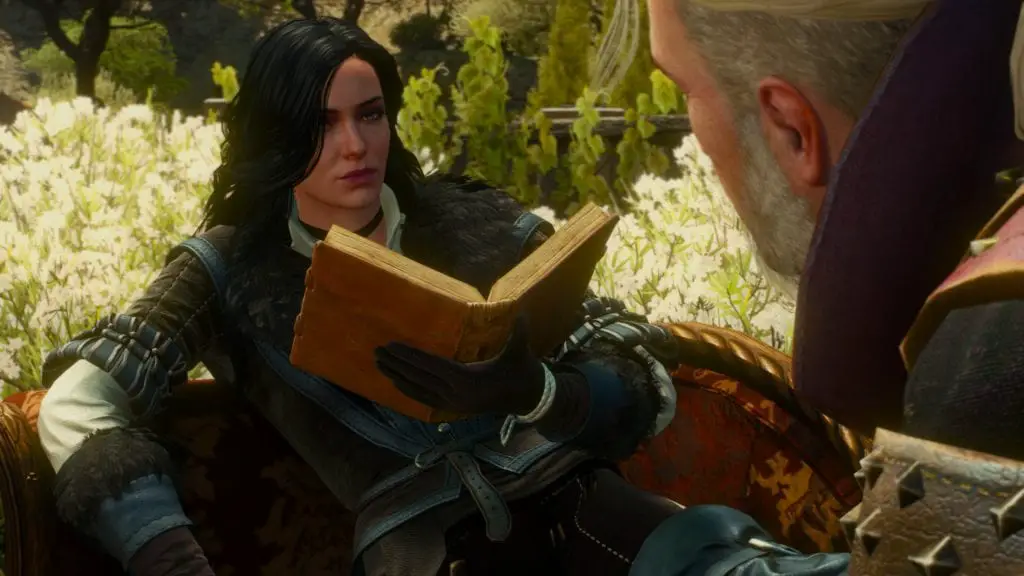
Now, none of these things is quite out of character. Triss is certainly acting more selflessly than we have ever seen her before, but she did fight in the Battle of Sodden and she did fight to save Geralt. She is not without bravery, and it is perfectly possible that the situation the mages found themselves in roused some heroic tendencies in her. And Yenn can be very single minded, and she cares about Ciri a lot.
But it still says something that the writers of Witcher 3 chose to script them in that way in their game, and I don’t think it’s an accident. Especially when some other writing choices are considered.
Triss is shown as clearly still being tenderly in love with Geralt, and heartbroken when he hints he is no longer interested. For some strange reason, too, the game – via a randomly interested Djikstra – tries its damnedest to make you confess your love to her. As someone firmly determined to pursue the romance with Yenn, I looked for an opportunity to gently but firmly tell Triss that I was not interested, but I never truly found it. She is left to guess from my behaviour. This is not out of character for Geralt, who had to have a vision-having Ciri say it for him in the books, but it is contrast to the romance with Yennefer.
There, you get an opportunity to flat-out refuse her and end any relationship with her on completely unambiguous terms. The context in which you do so is also mildly humiliating for her, though at least there are no witnesses.
Yennefer, too, is consistently shown as more unreasonably unpleasant than she is in the books. In contrast to the book scene where she supplicates to the goddess for a chance to save Ciri (a chance she gets at all by helping a random pregnant woman some time before), here we see her destroying the goddess’ holy garden without a second thought. She does what she wants in pursuit of her goal without even the smallest regard for the feelings of any of the parties concerned. Certain aspects of her character are emphasized.
And then there is the ending, the end of Blood and Wine to be more specific. I have already complained about this in my review of that game, but I have to mention it again. If Geralt ends up with Triss, she gets to keep her work as a sorceress while she is with him. Not a problem, really, as teleports can instantly take her from place to place.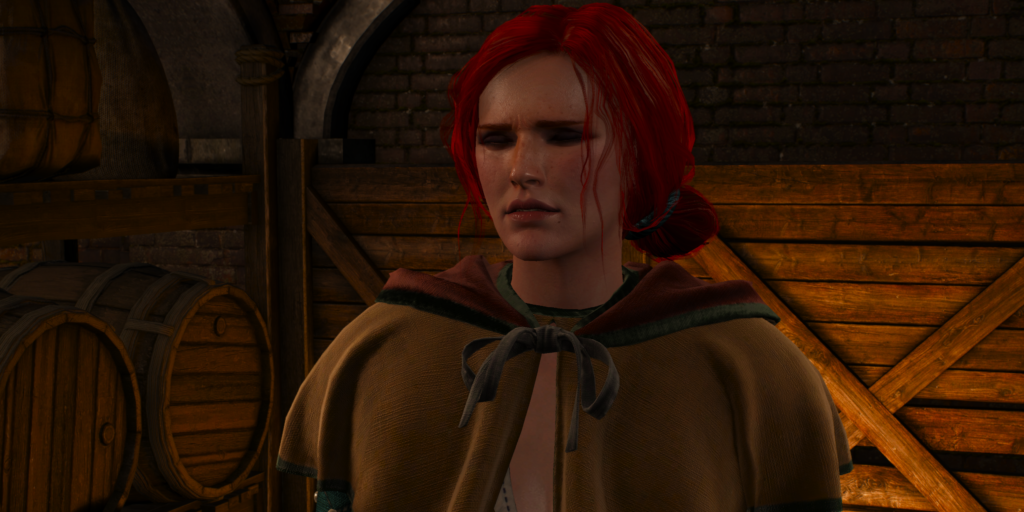
Yennefer, on the other hand, is made to give up all of her personal life and ambitions as she moves in with Geralt to his quiet vineyard. She is made to say how much she loves not doing anything but pleasure reading and what a “silly goose” she used to be for wanting anything but Geralt in her life.
It would be disgusting enough in and of itself, but in the context of what I said before, I cannot help but feel that she is being punished.
Punished for being too ambitious, too forward, not soft enough. For asking too much. Being too assertive. For being all the things a woman should not be, all in all.
Triss is allowed to keep her job because she managed to stay soft and feminine even when being a powerful sorceress. Yennefer has to be stripped of everything before we can imagine our hero being happy with her.
The hero who, let me remind you, magically bound her to his love in the first place.
Which the game did acknowledge, to be fair, only it never acknowledged it as his fault. They realized it was a problem in their relationship, but there is never any hint that Geralt bears the guilt for what Yenn went though in her emotional and romantic life in the least decade. Instead, she is supposed to give up everything to be worthy of him.
That…is not a pleasant way to script a romance.
Don’t get me wrong, Witcher 3 is one of the most feminist games I know as far as the central message goes. And this tendency to punish Yennefer existed in the books already, what with her being constantly in danger of being sexually abused and in need of saving, never really getting a chance to manifest her extreme power. She was punished every time she tried to do something, and especially when she dared to want something.
But in spite of all that, Sapkowski never tried to make her stop wanting those things. He wrote his setting as consistently sexist to the point that it was disgusting, but he didn’t have his female heroines conform to it in spite of all that. He made Yennefer the love of Geralt’s life for a reason, the messed up way he wrote their relationship notwithstanding.
The game’s issues started when they wrote Yennefer out of the first game. They claim it was because they were too afraid of writing her. Probably rightly so – the writing in that game was pretty atrocious, and Triss was completely out of character. Still, given what happened next, I have some doubts it was because they had such immense respect for her character.
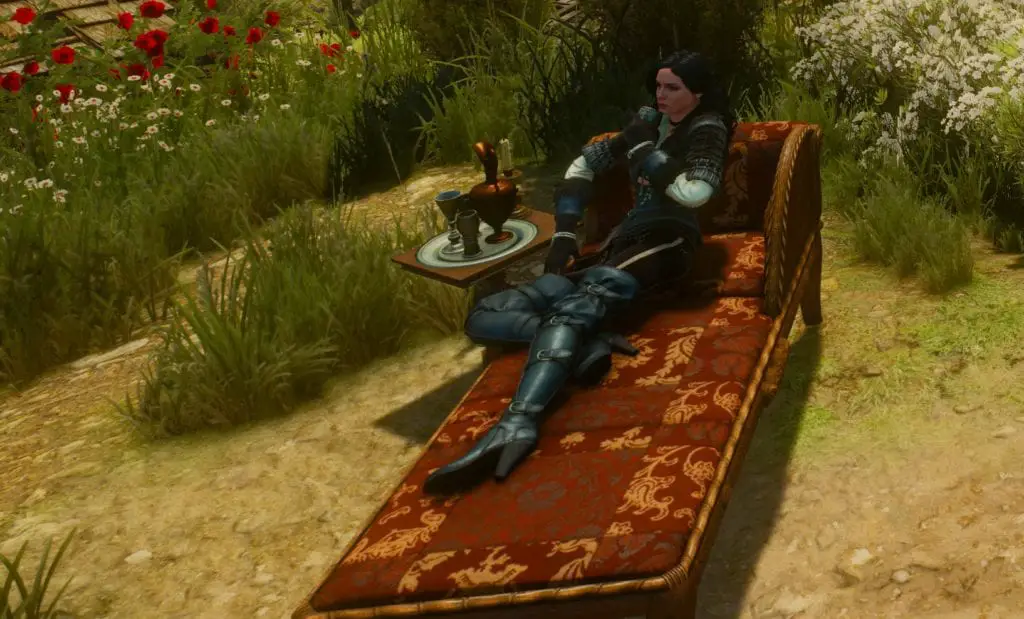
Not that being the romantic interest of the hero should be the crowing achievement of any female character. In fact, nothing would have made me happier than if, after being freed from the genie, Yenn accused Gerald of effectively raping her via a genie and never wanted to have anything to do with him again.
But at the same time, in his context, pushing Triss over Yennefer in the first two games gains new overtones I am very uncomfortable with. As I am with the way Witcher 3 emphasizes all of Triss’ good sides and all of Yenn’s bad ones.
Triss, as she is in Witcher 3, is a very good role model. Yennefer is not, or not particularly. Given that the situation is almost the exact reverse in the books, it makes you wonder why. And I for myself feel like the answer is not pretty. Be soft spoken and feminine, girls, it says. Otherwise, whatever great deeds you do will never count. After all, no one likes a shrew.

